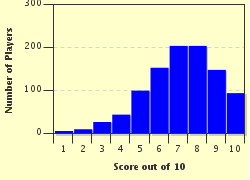Quiz Answer Key and Fun Facts
1. The American press dubbed this German Commander 'Smiling Albert' on the eve of the Italian campaign.
2. This Japanese general with a force of just 30,000 defeated 130,000 British, Australian and Indian troops when he conquered Malaya and Singapore and became known as the 'Tiger of Malaya'.
3. General Holland M Smith of the US Marine Corps considered to be the pioneer of amphibious warfare was known by his men as ________ .
4. When General Douglas MacArthur was leading a Division of the American Expeditionary Force on the Western Front in WW I he ordered his men to "Dig! Dig! Dig! Like your life depended on it!" he received the epithet 'Dugout Doug'.
5. This fighting Admiral was known as 'Bull' for his aggressive tactics when confronting an enemy.
6. This military commander was a staunch advocate of strategic area bombing for which he received the nickname 'Bomber'.
7. This cantankerous American General served on Chiang Kai-Shek's staff and led Chinese troops in northern Burma.
8. His habit of turning up unexpectedly at critical phases of the North African campaign earned Field Marshall Erwin Rommel the epithet __________________.
9. 'The Auk' had to put up with constant political interference while conducting military operations in the Desert War. He was finally sacked after the fall of Tobruk in June 1942. Who was 'The Auk'?
10. Hard talking General George S Patton's speeches to his men were always liberally sprinkled with profanities and they referred to him as:
Source: Author
mstanaway
This quiz was reviewed by FunTrivia editor
Exit10 before going online.
Any errors found in FunTrivia content are routinely corrected through our feedback system.

